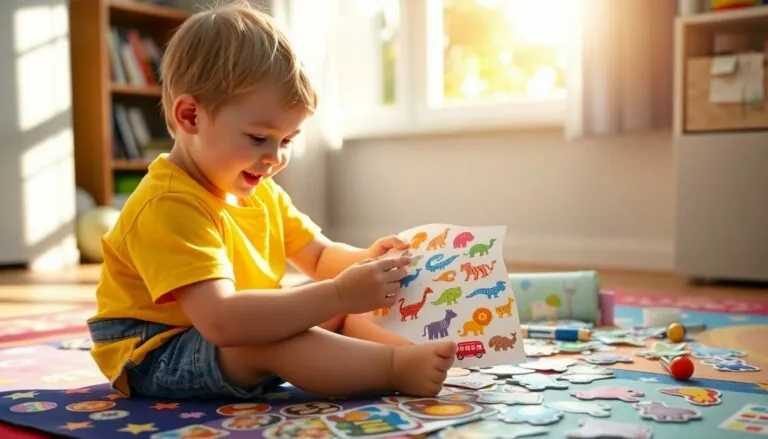Table of Contents
ToggleIn the bustling world of early childhood education, Pennsylvania’s Early Learning Standards stand out like a superhero cape on a toddler. These guidelines aren’t just a set of rules; they’re a roadmap to nurturing young minds and ensuring every child gets the best start possible. Imagine a world where kids are not only prepared for kindergarten but are also giggling their way through essential learning milestones. Sounds pretty great, right?
Overview of PA Early Learning Standards
Pennsylvania’s Early Learning Standards serve as a framework for children’s development from birth to age five. These standards focus on key domains that support growth in social-emotional skills, cognitive abilities, language, literacy, and physical development. By setting clear expectations, educators and caregivers can create rich learning environments.
The importance of these standards cannot be overstated. They provide guidance on what children should know and be able to do at different ages. Each standard reflects research-based best practices, ensuring that educational approaches promote effective learning.
Developmentally appropriate practices are at the core of these standards. Teachers are encouraged to assess children’s progress regularly, using a range of methods for observation and documentation. Resources are available to support educators in implementing these standards, ensuring consistency across various educational settings.
Families also play a crucial role in this process. Engaging parents in their child’s learning journey aligns home and school experiences, promoting further growth. With access to tools and information, parents can support their children’s development through everyday interactions and activities.
Collaboration among educators, families, and communities strengthens the impact of these standards. Partnerships can foster shared responsibility for early childhood education, amplifying the message that children’s learning is a community effort. By focusing on these key elements, Pennsylvania aims to ensure that all children enter kindergarten ready to succeed.
Importance of Early Learning Standards
Early learning standards play a crucial role in shaping children’s educational experiences. These guidelines ensure that young learners develop essential skills vital for their future.
Developmental Benefits
Developmental benefits of early learning standards appear in various child growth areas. Children gain social-emotional skills like empathy, self-regulation, and cooperation. These capabilities foster positive interactions with peers and adults. Cognitive development also thrives through engaging activities that promote problem-solving and critical thinking. Language and literacy skills emerge as educators nurture communication through storytelling and conversations. Physical development gains attention, enhancing motor skills through play and movement. As children progress, they build confidence and resilience, enabling them to tackle new challenges.
Educational Outcomes
Educational outcomes are directly linked to the implementation of early learning standards. Standards contribute to a smoother transition to kindergarten by aligning curriculum expectations. Children entering school equipped with foundational skills demonstrate greater academic success. Studies indicate that early achievement correlates with improved performance in later grades. These guidelines promote equity, ensuring all children, regardless of background, have access to quality education. Educators utilize standards to tailor instruction, meeting diverse learning needs. When families engage in the learning process, outcomes improve further, creating a supportive network around children’s educations.
Key Components of PA Early Learning Standards
Pennsylvania’s Early Learning Standards focus on several core components that shape children’s educational experiences. These components guide educators in fostering holistic development in young children.
Domains of Learning
Several domains frame the PA Early Learning Standards. Social-emotional skills promote healthy relationships and self-regulation. Cognitive abilities emphasize critical thinking and problem-solving through engaging activities. Language and literacy skills enhance communication and comprehension, laying the groundwork for reading and writing. Physical development, including gross and fine motor skills, allows children to explore their environment through play. Connections among these domains ensure a comprehensive approach to early education, enabling children to thrive across various areas of their growth.
Performance Indicators
Performance indicators highlight expected outcomes within each domain of learning. Educators can use these indicators to assess children’s progress accurately. Specific goals, such as expressing emotions or building vocabulary, serve as measurable benchmarks. Observation methods allow for ongoing assessments, ensuring that instruction meets children’s needs. Tracking developmental milestones helps identify areas for improvement, aligning educational practices with the standards. These indicators foster meaningful interactions between educators and children, promoting a supportive learning environment.
Implementation Strategies
Effective implementation of Pennsylvania’s Early Learning Standards requires coordinated strategies. It emphasizes the professional development of educators and the involvement of families and communities.
Educator Training
Training for educators forms the backbone of successful implementation. Quality professional development equips teachers with the necessary skills to understand and apply the early learning standards effectively. Workshops and ongoing training sessions should focus on developmentally appropriate practices and assessment techniques. Specific strategies may include modeling lessons, sharing resources, and providing mentorship. Regular evaluations of educator progress ensure that pedagogical approaches align with children’s developmental needs.
Parent and Community Involvement
Engaging parents and communities contributes significantly to the implementation of early learning standards. Collaborative efforts foster stronger home-school connections, creating a supportive environment for children. Schools can facilitate workshops that educate families about the standards and their importance. Also, involving community organizations in early childhood education strengthens resources available to families. Regular communication through newsletters, events, and meetings keeps parents informed and involved. Active participation from families enhances children’s learning experiences, aligning educational goals across settings.
Challenges and Considerations
Pennsylvania’s Early Learning Standards face various challenges that require attention to ensure effective implementation. Understanding these issues is vital for educators, families, and communities.
Equity and Access
Equity in early childhood education remains a significant concern. All children, regardless of background, deserve access to quality learning experiences. Disparities in resources can affect children’s readiness for kindergarten. It’s essential for programs to identify and address barriers that prevent equitable access. By enhancing outreach efforts, educators can reach underserved populations effectively. Collaboration with community organizations can also enhance resource availability. Parents play an active role in advocating for their children’s needs, ensuring inclusivity within educational settings.
Assessment and Evaluation
Assessment practices pose another challenge in early childhood education. Standardized assessments may not accurately reflect individual children’s progress. Educators should utilize diverse methods to monitor development, emphasizing ongoing observations and portfolio assessments. Engaging families in the evaluation process enhances understanding and support. Evaluating outcomes through different lenses leads to a more complete picture of a child’s readiness for school. Regular professional development opportunities for educators can improve assessment techniques, aligning evaluations with Pennsylvania’s Early Learning Standards to foster meaningful growth.
Conclusion
Pennsylvania’s Early Learning Standards play a crucial role in shaping the educational journey of young children. By providing a structured framework that emphasizes holistic development educators can create nurturing environments that foster growth in key areas. The collaboration between families and educators is vital in ensuring that children receive consistent support both at home and in school.
As these standards continue to evolve they offer a pathway to equitable education for all children. By addressing challenges and focusing on inclusive practices educators can help every child thrive and succeed as they transition into kindergarten and beyond. The commitment to these standards ultimately lays a solid foundation for lifelong learning and achievement.







